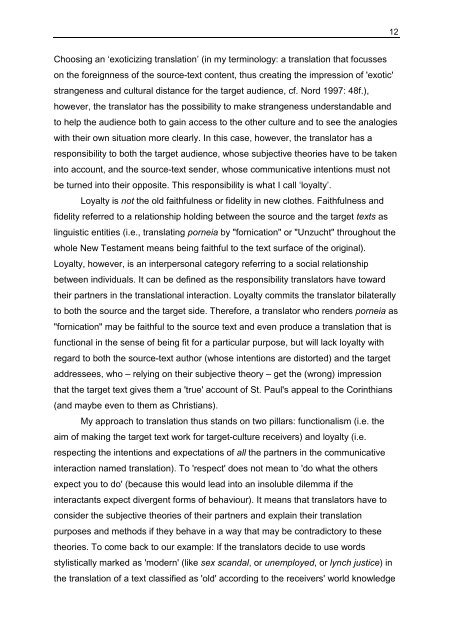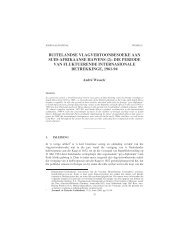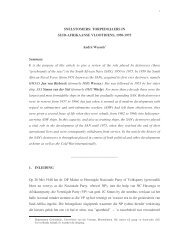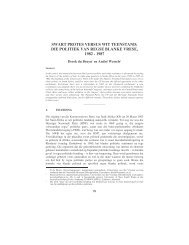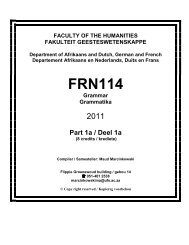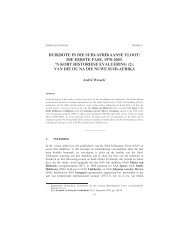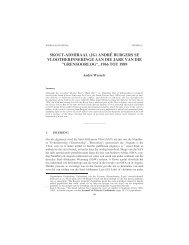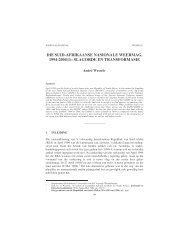Function plus Loyalty: Ethics in Professional Translation
Function plus Loyalty: Ethics in Professional Translation
Function plus Loyalty: Ethics in Professional Translation
Create successful ePaper yourself
Turn your PDF publications into a flip-book with our unique Google optimized e-Paper software.
Choos<strong>in</strong>g an ‘exoticiz<strong>in</strong>g translation’ (<strong>in</strong> my term<strong>in</strong>ology: a translation that focusses<br />
on the foreignness of the source-text content, thus creat<strong>in</strong>g the impression of 'exotic'<br />
strangeness and cultural distance for the target audience, cf. Nord 1997: 48f.),<br />
however, the translator has the possibility to make strangeness understandable and<br />
to help the audience both to ga<strong>in</strong> access to the other culture and to see the analogies<br />
with their own situation more clearly. In this case, however, the translator has a<br />
responsibility to both the target audience, whose subjective theories have to be taken<br />
<strong>in</strong>to account, and the source-text sender, whose communicative <strong>in</strong>tentions must not<br />
be turned <strong>in</strong>to their opposite. This responsibility is what I call ‘loyalty’.<br />
<strong>Loyalty</strong> is not the old faithfulness or fidelity <strong>in</strong> new clothes. Faithfulness and<br />
fidelity referred to a relationship hold<strong>in</strong>g between the source and the target texts as<br />
l<strong>in</strong>guistic entities (i.e., translat<strong>in</strong>g porneia by "fornication" or "Unzucht" throughout the<br />
whole New Testament means be<strong>in</strong>g faithful to the text surface of the orig<strong>in</strong>al).<br />
<strong>Loyalty</strong>, however, is an <strong>in</strong>terpersonal category referr<strong>in</strong>g to a social relationship<br />
between <strong>in</strong>dividuals. It can be def<strong>in</strong>ed as the responsibility translators have toward<br />
their partners <strong>in</strong> the translational <strong>in</strong>teraction. <strong>Loyalty</strong> commits the translator bilaterally<br />
to both the source and the target side. Therefore, a translator who renders porneia as<br />
"fornication" may be faithful to the source text and even produce a translation that is<br />
functional <strong>in</strong> the sense of be<strong>in</strong>g fit for a particular purpose, but will lack loyalty with<br />
regard to both the source-text author (whose <strong>in</strong>tentions are distorted) and the target<br />
addressees, who – rely<strong>in</strong>g on their subjective theory – get the (wrong) impression<br />
that the target text gives them a 'true' account of St. Paul's appeal to the Cor<strong>in</strong>thians<br />
(and maybe even to them as Christians).<br />
My approach to translation thus stands on two pillars: functionalism (i.e. the<br />
aim of mak<strong>in</strong>g the target text work for target-culture receivers) and loyalty (i.e.<br />
respect<strong>in</strong>g the <strong>in</strong>tentions and expectations of all the partners <strong>in</strong> the communicative<br />
<strong>in</strong>teraction named translation). To 'respect' does not mean to 'do what the others<br />
expect you to do' (because this would lead <strong>in</strong>to an <strong>in</strong>soluble dilemma if the<br />
<strong>in</strong>teractants expect divergent forms of behaviour). It means that translators have to<br />
consider the subjective theories of their partners and expla<strong>in</strong> their translation<br />
purposes and methods if they behave <strong>in</strong> a way that may be contradictory to these<br />
theories. To come back to our example: If the translators decide to use words<br />
stylistically marked as 'modern' (like sex scandal, or unemployed, or lynch justice) <strong>in</strong><br />
the translation of a text classified as 'old' accord<strong>in</strong>g to the receivers' world knowledge<br />
12


